We’ve had a decade of the Game Awards, aka the Geoff Keighley show. There are other accolade-awarding bodies like the BAFTAs and the Game Developers Choice Awards at GDC, but Keighley has spent the last several years determined to make the Game Awards into the gaming industry’s Hollywood. This year’s show, airing next week on December 12, will announce the winners of over 30 accolades. While the event is sometimes not actually enough about the devs, there is always significant hype around the Game of the Year (GOTY).
Again, the Game Awards did not invent the GOTY—there’s a whole Wikipedia page dedicated to listing other versions of the prize—but they have successfully dominated much of the last decade’s conversation about what makes the best games great. The Game Awards does a “blended vote” for all of their nominees where the winner is chosen by a combined vote of a jury of industry experts (90%) and public voting (10%).
How do the Game Awards GOTYs stand up to the test of time? One of our writers, Gary (who you’ll hear from below), suggested we, as our writing collective, rank the past 10 years of winners. 15 of our writers voted, leading to a spirited discussion of the results in our site Discord. I’ve assigned some of our contributors to write about games they had strong feelings about. So, join us in a reflection, and let us know if we got it right or wrong (particularly when it comes to number one!).
– Amanda Tien, Editor

10. Overwatch (2016 GOTY Winner)
History has not been kind to Overwatch. From Activision Blizzard’s failed running of the professional Overwatch League to a half-baked, poorly thought-out “sequel,” the post-launch life of the game has been one disappointment after another. Plagued with bad balance and rushed changes, every patch felt like a chisel chipping away at its core identity.
But in 2016, Overwatch was a phenomenon. The ease of entry and high skill ceiling made a perfect balance for long-time FPS players and newcomers alike. The characters were diverse and engaging, even if most games had three Genjis running around. But most importantly, it was a blast to play.
Overwatch quickly became the social game for my group of friends. We’d kill weekends just running matches, laughing, catching up, and complaining about bad DPS players. There was always joy and connection in experimenting with different comps, playing as a five-stack with one random. While Overwatch wasn’t perfect (I’m still not sure how role-locking didn’t get implemented for a few months), it was always fun.
The 2016 GOTY winner ranked dead last by a long shot in our site-wide rankings, but I will always love Overwatch. Warts and warthogs and all.
– Written by Gary Wilson
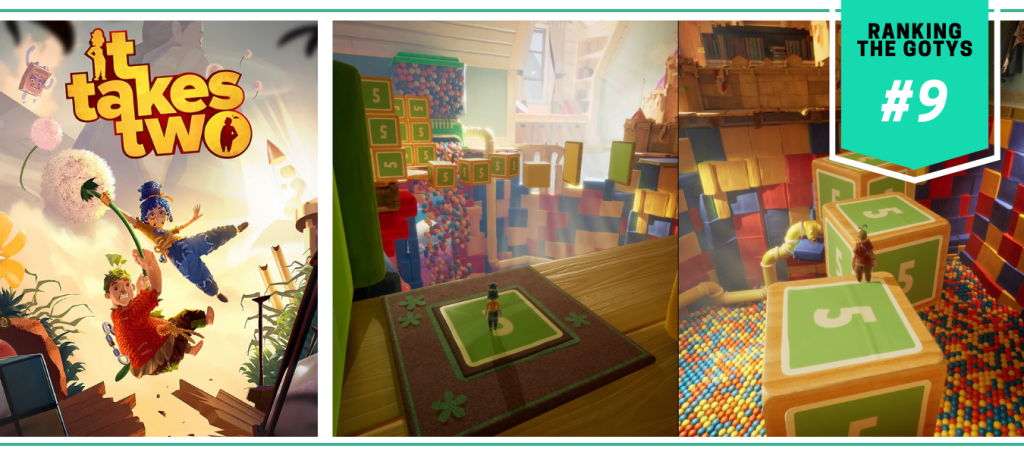
9. It Takes Two (2021 GOTY Winner)
In many ways, It Takes Two should be the perfect game for me. My wife and I love couch co-op-style adventures. We often feel like there aren’t enough games specifically built for two players to enjoy simultaneously. It can still be a good time to watch the other person play through something like Zelda or Pikmin, but there’s nothing quite like working together to beat a game as a team. The irony is not lost on me, then, that a game about repairing a fracturing marriage almost created another one in my own home (we’re doing great, thanks for asking!).
I give It Takes Two a ton of credit. It is a sparkling example of how to create a truly cooperative gaming experience where players must communicate and collaborate if they want to be successful. You absolutely cannot rely on one player to drag the other to victory; each area requires a well-thought-out plan and careful coordination to get through. Not only is this type of teamwork challenging by nature, but the game is no walk in the park in general. Puzzles, platforming, and boss fights all prove to be formidable tests, and the added complexity of doing everything in tandem means this game is not for anyone in an already rocky relationship (seriously, all good!).
If you’re looking for a supremely polished, tricky, and rewarding game that asks a lot of you and a trusted pal, then look no further. It Takes Two might be the best co-op game I’ve ever played; I’m just not so sure my wife would have the same opinion (she still loves me, I promise!).
– Written by Zack Gulinello

8. Dragon Age: Inquisition (2014 GOTY Winner)
I can still remember my player-created protagonist from Dragon Age: Inquisition. She had bright red hair, which she kept braided and pinned behind her ears. She was a runaway mage with a troubled background, favoring explosive spells on the battlefield. She was willing to explore the darker and stranger corners of the world, taking on quests with sad ghosts and trips into the netherworld. She was a bit of a heartbreaker, unintentionally romancing a few of her compatriots. When the going got tough, she spent time emphasizing diplomacy, spending hours pouring over a strategic map in her war room, sending envoys out. Even though she never had a true home, she invested time and money into making the castle keep in the mountains a safe and comfortable place for all.
I also remember that I didn’t really care about the big bad from Dragon Age: Inquisition. He was from the underworld, and there were a bunch of spells we had to do and portals to go through and blah blah. Magic stuff. You get it. I know that some of the elves were definitely mad at other elves… but I’m not… entirely sure… why…. The Dragon Age franchise has a deep lore, both within and outside of the games themselves.
Dragon Age: Inquisition and the series overall is burdened by the baggage of its own lineage. Long story short, BioWare made the original Baldur’s Gate game in 1998, and later wanted to create their own IP to do (and earn) more, launching Dragon Age: Origins in 2009. Each game in the series, including the new Dragon Age: The Veilguard, seems to be a response to something from the game before, rather than looking ahead. For example, Inquisition had a famously long opening act called the Hinterlands, whereas Veilguard throws you into the action as soon as possible.
While Dragon Age: Inquisition may not have ranked as high as I think it deserves on our site-wide ranking, its impact on the gaming industry is clear. The very next year, The Witcher 3: Wild Hunt—lauded by many as the best RPG of all time—was released, making clear progress in so many ways with intentionally written quests, a bold clear storyline, and focused action. And, almost a decade later, Larian’s Baldur’s Gate 3 honors and improves so much of BioWare’s character-driven stories and immersive world-building. As the first-ever GOTY awarded by the Game Awards, and one of my first obsessive games I played as a grown-up, Dragon Age: Inquisition will always have a special place in history and in my heart.
– Written by Amanda Tien

7. The Last of Us Part II (2020 GOTY Winner)
While much ink has been spilled about The Last of Us Part II since its release, I played it for the first time this year; it was an immensely revelatory experience. It’s a game with so much emotional vulnerability, willing to take risks that would alienate players for the sake of telling a story in the way it wants to. Characters succumb to their desires and are left empty, losing everything they love in the process.
In addition to heart-wrenching stories, The Last of Us Part II features some of the tightest, most difficult stealth-action third-person shooter gameplay. There’s an impeccably designed set of seven difficulty modes. The hardest mode, Grounded, forces players to engage with every system and mechanic to barely get by some of the trickiest encounters, all without losing its grip on the pacing for the 35 hours it takes to complete.
While The Last Of Us Part II is not a game for everyone (especially as it deals with some pretty heavy subjects that might not be to everyone’s tastes), by the end I was feeling a beautiful emptiness that I’ve only ever felt two other times while watching, playing, and reading something. If the list were up to me, I’d rank The Last Of Us Part II in the top spots, just in terms of how much of an impact these games had on me. Even still, it’s a game I hold a very warm love toward, contrary to all the overblown expectations I had going into it.
– Written by Eithan Rosemberg

6. Sekiro: Shadows Die Twice (2019 GOTY Winner)
Sekiro: Shadows Die Twice didn’t click for me at first. I approached it like FromSoftware’s Bloodborne or Demon’s Souls. It initially felt more linear than either with fewer options for customization. An early boss completely obliterated me in a way that left me feeling burnt.
Yet, once I learned the choreography of Sekiro’s combat, it made me feel like I had mastered a dance like no other game has. Embracing the protagonist Wolf’s range of tools proved rewarding and enriching. Perfecting the game’s parrying and blocking mechanics was not only essential to surviving but deeply rewarding to get right. Not only was it a joy to get good at Sekiro, but playing it simply made me better at other games.
The level design in Sekiro is phenomenal. The grappling hook added depth to the verticality of the world in a way still unmatched in FromSoftware’s oeuvre. Each area beautifully builds on the last while paying homage to mythology.
We may never get another Tenchu game, but Sekiro more than filled that gap in 2019. While FromSoft’s 2023 Armored Core VI: Fires of Rubicon borrowed the fast combat and some of the linear elements, I would love for the studio to return to and continue evolving the Sekiro formula.
– Written by Clint Morrison, Jr.
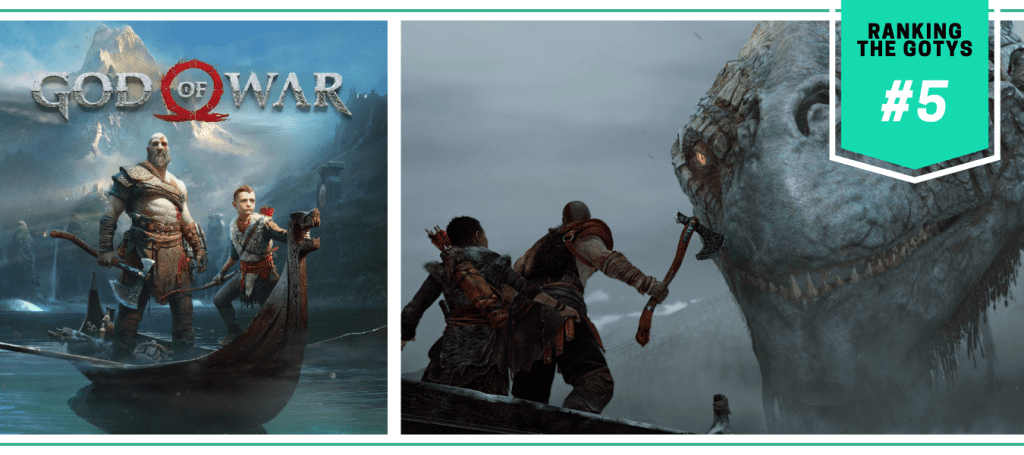
5. God of War (2018 GOTY Winner)
I never played the original God of War games growing up. I don’t want to talk about the reason (I wasn’t allowed to; I’m not over it). So while I missed out on playing the Greek trilogy, I was able to go into the 2018 reboot with a clean slate. And, given how this was a very different game, I’m glad I did.
With all due respect to the fans of the originals, the 2018 God of War was an absolute masterpiece of a game. I’ve played it twice now, once on PS4 and again on PS5, and each time was incredible.
The game is, at its core, a journey of self-discovery between a father who is ashamed of his past and a son who is unaware of his true self. Kratos’ rough demeanor and Atreus’ childhood wonder make for a compelling duo. You can feel Kratos’ frustrations in protecting his son, but also see how he is holding Atreus back from growing up. As their journey progresses, you see their relationship growing stronger, as evidenced by puzzles that require both characters to solve as well as their teamwork in combat.
And oh, is that combat rewarding. The weight of the Leviathan Axe is real, and the buildup to acquiring the Blades of Chaos is a massive payoff. The boss battles with Baldur are, for lack of a better word, absolutely insane, with the game throwing you into the thick of it in a matter of minutes. And of course, the game is drop-dead gorgeous through all this, with spectacular settings across Norse lore serving as hosts for these fights.
If I had to give one criticism, it’s that the standard enemies are pretty repetitive. That doesn’t really matter, however, as God of War is not an epic story—it is a deeply personal one. By the end of the game, our heroes have gone through victory, through loss, and have come to terms with both, now ready to take on the world together, as father and son, working to be better than the past that Kratos left behind.
On a final note: There is some irony to all this. In 2018, God of War beat out the game that has gone on to be my favorite of all time: Red Dead Redemption 2. To each their own. Much like Kratos learns at the end of his journey, it is not our responsibility to hold another back for the sake of ourselves. It is our job to be better. We are beyond lucky to have gone through a year with not one, but two masterpieces that will surely transcend the annals of gaming.
– Written by Mark Bowers
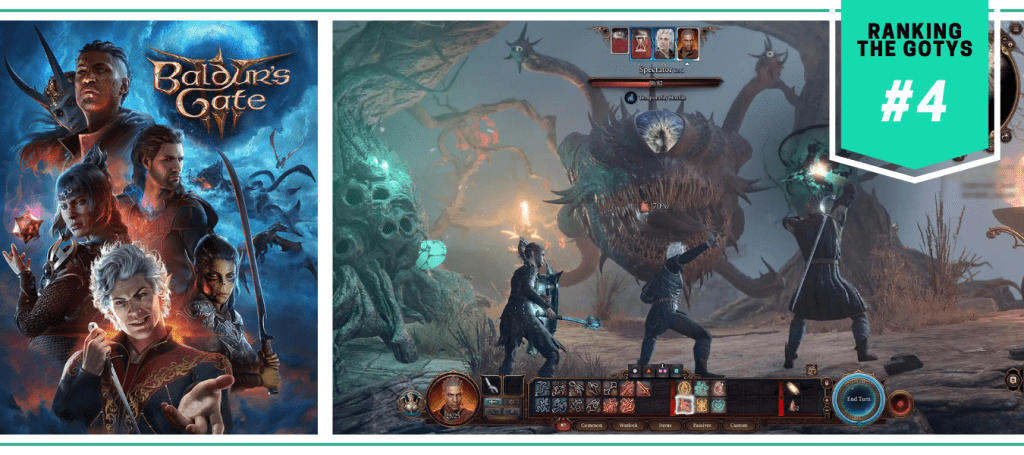
4. Baldur’s Gate 3 (2023 GOTY Winner)
You know, if you’d come up to 2019 Joe and told him that the next five years would bring two of the best CRPGs of all time, he probably would have shaken his head in disbelief. Yet here we are: 2019 introduced us to the award-winning Disco Elysium, and then four years later, we got Baldur’s Gate 3.
What is there to say about this magnum opus? I could talk to you for pages about how its combat system instantly ameliorates one of my worst CRPG pain points. I could tell you all about how my girlfriend, not normally a hardcore gamer, was driven to finish the game on Honour Mode. I could tell you why a few of us easily talked about the game for hours. Instead, let’s take a close look at one little moment from Baldur’s Gate 3.
Early on, you come across Blighted Village, a settlement that’s been taken over by goblins. The first time that I tried to take this village on, I wandered through the front gate and got pulverized. Then I decided to do something that you normally can’t do in CRPGs with very much success: I decided to jump. By jumping and scrambling up a conveniently-placed boulder, I could jump onto the first house in the village, and begin wreaking havoc by pushing goblins off their high perches. After thinning the ranks, I had the rest of my party stride in and clean up. It was such a wonderfully liberating moment, a moment that spoke of the genuine player freedom that has so rightfully earned Baldur’s Gate 3 its place on this list.
I thought that my first run of 100+ hours was thorough, but I’ve since seen areas, people, and quests that I completely missed. There is seemingly always more content to find. This game may not have the same place in my heart that Sekiro does, but it’s a wonderful RPG, and easily one of the best ever made. If, by some strange contrivance, you’ve not played Baldur’s Gate 3 yet, bring it to the front of your backlog. It’s genuinely sensational.
– Written by Joe Chivers

3. The Witcher 3: Wild Hunt (2015 GOTY Winner)
The Witcher 3: Wild Hunt is one of the few games whose staying power should always place it as number one on any list. You need only to look at the opening hours to see why.
The deceptively perfect tutorial quest encapsulates what it means to be a Witcher. It lays out many features of the game such as preparation, exploration, and ultimately patience as each encounter is potentially fatal. The world of the game feels alive with events that kick off separate quest lines and major environment shifts that divide the game into easy-to-follow acts explaining the state of the world and the destiny of its characters.
Small villages across the large map add necessary weight to this detail-rich world. In other games, these towns might feel like randomly generated placeholders, but each is deeply intentional. Villagers’ requests often end in a decision-making process where you must choose the lesser of two evils, a central theme of the series where one party will always come to resent you. In video games, the main characters are often heroes without reproach—here, the quests are proof that being a Witcher is an ostracizing profession.
The creators at CD Projekt Red bring together lore from the long-running book series while also building upon events from the previous games. People and monsters are intricately intertwined in this world and more often than not, it’s hard to tell who is evil. Your judgment and ability to gather information weigh heavily into a world of violent shifting politics, danger, and self-interest. Moreover, each decision you make is felt in the game, from the scale of a village to the development of major cities. You run into trouble with familiar faces, reunite with old friends, rediscover long-lost romance or unexplored desire, and experience a grand finale that defines them all. Betwixt it all, you get arguably the greatest mini-game ever made in Gwent, which you will come to either love or despise.
Above all else, The Witcher 3: Wild Hunt is a full-fledged fantasy experience defined by the bonds of those we love and how those relationships hold when the chaos of the world comes to rip us apart. There are few games whose decisions haunt me after a playthrough and whose characters I want to see find peace above all else. Throw in two excellent DLCs, and you have the recipe for an RPG that will define the genre forever.
– Written by Vaughn Hunt

2. The Legend of Zelda: Breath of the Wild (2017 GOTY Winner)
The Legend of Zelda: Breath of the Wild is, to me, a masterpiece. Ever since playing my first Zelda game, I’d always wanted to explore Hyrule Castle and discover all of its inevitable hidden rooms and secrets. Imagine my delight when I found out that in this Zelda title, I could not only explore Hyrule Castle, but the rest of the world.
In 2017, I had been seriously missing the Zelda franchise—I didn’t own any consoles anymore. My dad surprised me and my younger brother for Christmas that year with the new Zelda game along with a Nintendo Switch and we—just in the middle of our angsty sibling rivalry arc—had to share (the horror). Breath of the Wild brought me closer to my little brother and, eventually, my two much older siblings. I got so much joy out of puzzling out the shrines together, climbing mountains, and collectively making fun of my sister for trying to ride a Lynel.
It’s no secret that Breath of the Wild was an experiment gone completely right. No other Zelda game had a totally open world, complete with open-ended puzzles and a generally non-linear story progression. Its novelty had me playing this game for years, and I still occasionally pick it up today (even over its successor, Tears of the Kingdom). Aside from my personal relationship-building and childhood wonder, Breath of the Wild stands on its own as a groundbreaking video game that manages to please long-term fans and amaze newcomers to the franchise.
– Written by Alexia Dahlin

1. Elden Ring (2022 GOTY Winner)
What superlatives exist to lay at the feet of Elden Ring that haven’t already been done so? Hidetaka Miyazaki and FromSoftware’s magnum opus, and one of the most critically acclaimed games of all time, Elden Ring penetrated the public gaming consciousness in a way that none of FromSoftware’s games have since the first Dark Souls. After a marketing cycle that featured a sole trailer at E3 2019 followed by two years of radio silence until a reappearance at Summer Games Fest 2019 (another Geoff Keighley joint), the hype was nearly unparalleled, and yet somehow Elden Ring delivered all that and more.
If Sekiro is about a singular focus on refining a mechanical skill, then Elden Ring is about a refinement of a different kind—a masterclass in honing a mainstream appeal while staying true to the roots of Miyazaki’s philosophy of what makes a game rewarding and enjoyable. The team’s ability to adjust the Dark Souls formula into an open world, to keep the rigor of the combat and exploration in an open world that rewards freedom and buildcraft is what makes Elden Ring remarkable. FromSoftware deftly balanced adhering to the rigidity of its previous titles to please purist followers, while also offering a challenge that is somehow modular that brought in a wider range of gamers.
Elden Ring isn’t a perfect game by any means. FromSoft superfans can probably point to several areas where other entries in the studio’s release history were superior. The side quests remain as obtuse as ever, and the performance still leaves something to be desired. Despite all of that, Elden Ring has become an institution of gaming, an almost-economy of content all on its own, from bizarre controller challenge runs to ASMR lore interpreters to entries in the internet memory hall of fame. Elden Ring is well-deserving of its spot at the top of this list of lauded games.
– Written by Kei Isobe
Agree (or Not) With Our Rankings? What Should Win GOTY 2024?
Let us know in the comments which games got their due praise, which had victory unjustly stolen from them, and what your frontrunner guesses are for next week’s 2024 Game Awards.


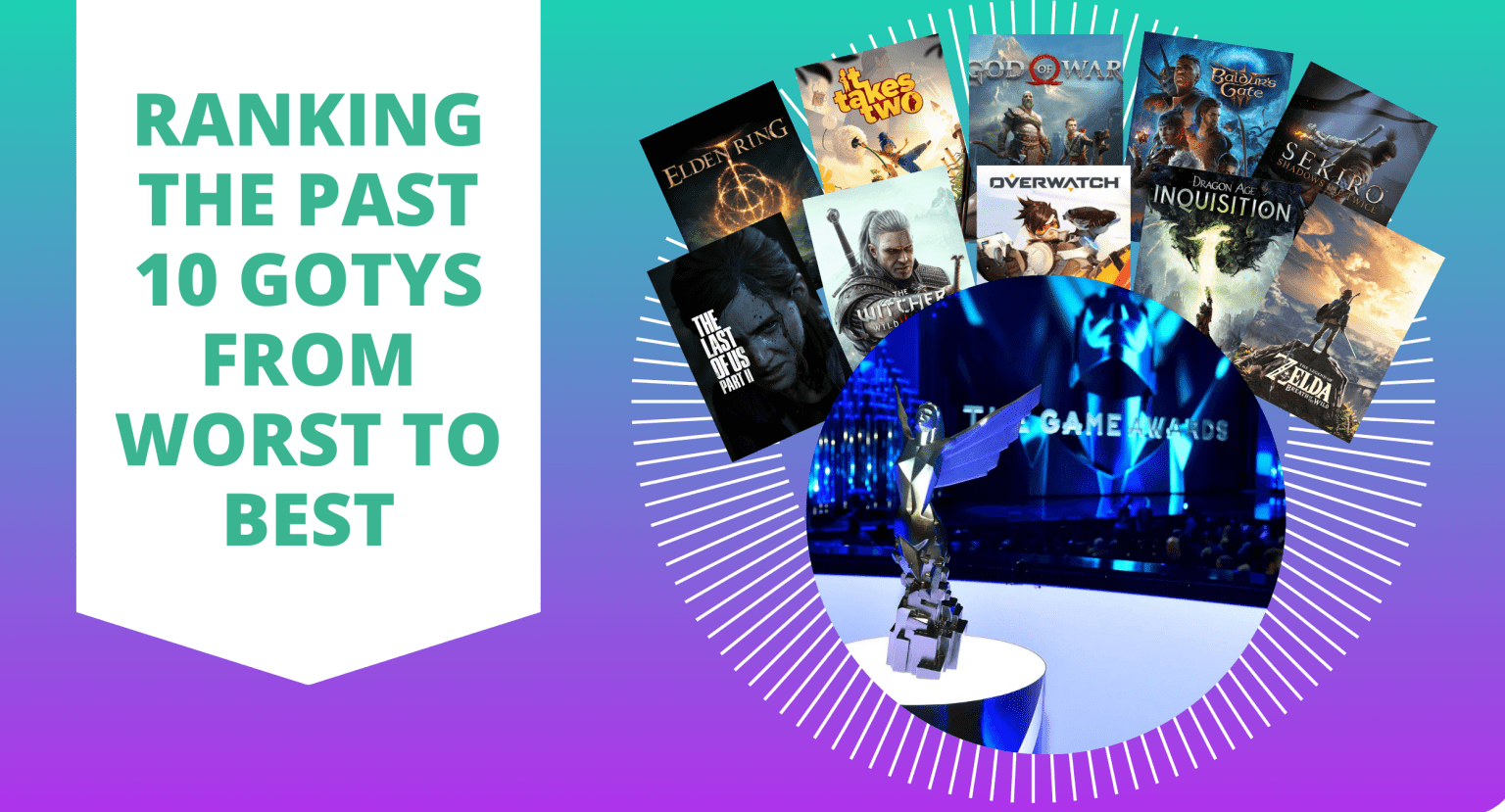























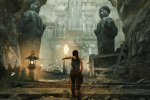

















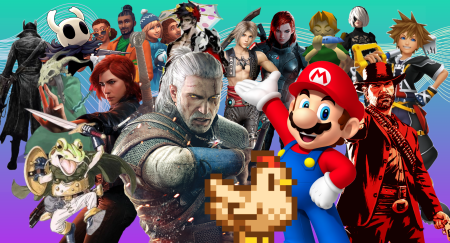
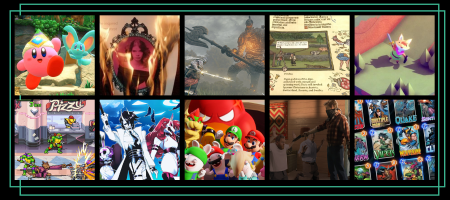

2 Comments
zack — you wrote exactly how i feel about it takes two lol and in such a funny and real way. so glad you wrote about it.